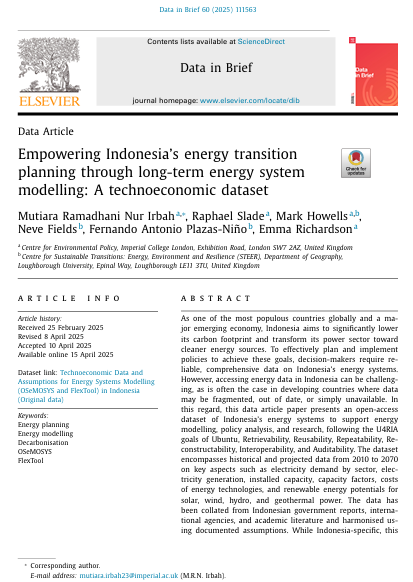
Keyword(s)
Author(s)
Mutiara Ramadhani Nur Irbah, Raphael Slade, Mark Howells, Neve Fields, Fernando Antonio Plazas-Niño, Emma Richardson
Country(ies)
Publisher
Published Date
Access
DOI
1. Centre for Environmental Policy, Imperial College London, Exhibition Road, London SW7 2AZ, United Kingdom
2. Centre for Sustainable Transitions: Energy, Environment and Resilience (STEER), Department of Geography, Loughborough University, Epinal Way, Loughborough LE11 3TU, United Kingdom
As one of the most populous countries globally and a major emerging economy, Indonesia aims to significantly lower its carbon footprint and transform its power sector toward cleaner energy sources. To effectively plan and implement policies to achieve these goals, decision-makers require reliable, comprehensive data on Indonesia’s energy systems. However, accessing energy data in Indonesia can be challenging, as is often the case in developing countries where data may be fragmented, out of date, or simply unavailable. In this regard, this data article paper presents an open-access dataset of Indonesia’s energy systems to support energy modelling, policy analysis, and research, following the U4RIA goals of Ubuntu, Retrievability, Reusability, Repeatability, Reconstructability, Interoperability, and Auditability. The dataset encompasses historical and projected data from 2010 to 2070 on key aspects such as electricity demand by sector, electricity generation, installed capacity, capacity factors, costs of energy technologies, and renewable energy potentials for solar, wind, hydro, and geothermal power. The data has been collated from Indonesian government reports, international agencies, and academic literature and harmonised using documented assumptions. While Indonesia-specific, this dataset could serve as a template for developing similar energy datasets in other countries, which may face similar challenges in developing energy transition planning.